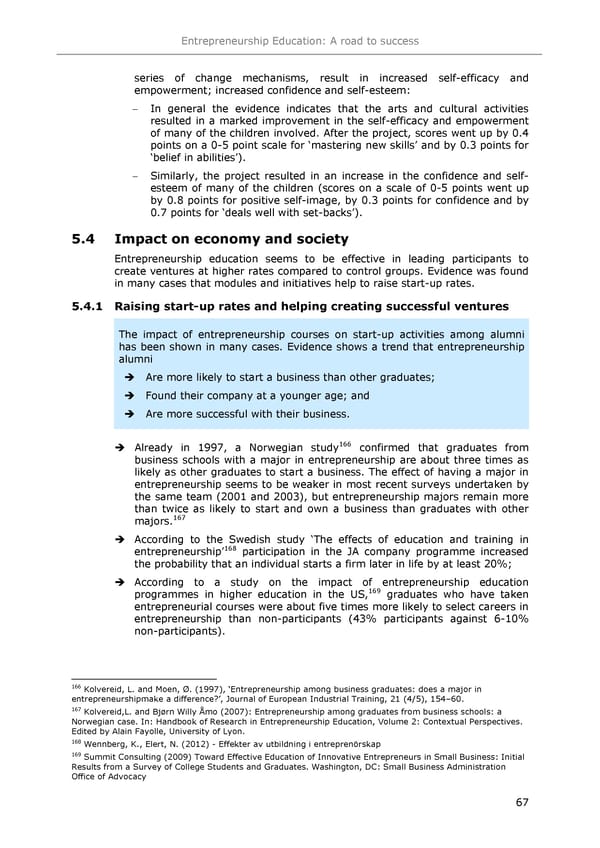Entrepreneurship Education: A road to success series of change mechanisms, result in increased self-efficacy and empowerment; increased confidence and self-esteem: In general the evidence indicates that the arts and cultural activities resulted in a marked improvement in the self-efficacy and empowerment of many of the children involved. After the project, scores went up by 0.4 points on a 0-5 point scale for 8mastering new skills9 and by 0.3 points for 8belief in abilities9). Similarly, the project resulted in an increase in the confidence and self- esteem of many of the children (scores on a scale of 0-5 points went up by 0.8 points for positive self-image, by 0.3 points for confidence and by 0.7 points for 8deals well with set-backs9). 5.4 Impact on economy and society Entrepreneurship education seems to be effective in leading participants to create ventures at higher rates compared to control groups. Evidence was found in many cases that modules and initiatives help to raise start-up rates. 5.4.1 Raising start-up rates and helping creating successful ventures The impact of entrepreneurship courses on start-up activities among alumni has been shown in many cases. Evidence shows a trend that entrepreneurship alumni Are more likely to start a business than other graduates; Found their company at a younger age; and Are more successful with their business. Already in 1997, a Norwegian study166 confirmed that graduates from business schools with a major in entrepreneurship are about three times as likely as other graduates to start a business. The effect of having a major in entrepreneurship seems to be weaker in most recent surveys undertaken by the same team (2001 and 2003), but entrepreneurship majors remain more than twice as likely to start and own a business than graduates with other 167 majors. According to the Swedish study 8The effects of education and training in 168 entrepreneurship9 participation in the JA company programme increased the probability that an individual starts a firm later in life by at least 20%; According to a study on the impact of entrepreneurship education programmes in higher education in the US,169 graduates who have taken entrepreneurial courses were about five times more likely to select careers in entrepreneurship than non-participants (43% participants against 6-10% non-participants). 166 Kolvereid, L. and Moen, Ø. (1997), 8Entrepreneurship among business graduates: does a major in entrepreneurshipmake a difference?9, Journal of European Industrial Training, 21 (4/5), 154360. 167 Kolvereid,L. and Bjørn Willy Åmo (2007): Entrepreneurship among graduates from business schools: a Norwegian case. In: Handbook of Research in Entrepreneurship Education, Volume 2: Contextual Perspectives. Edited by Alain Fayolle, University of Lyon. 168 Wennberg, K., Elert, N. (2012) - Effekter av utbildning i entreprenörskap 169 Summit Consulting (2009) Toward Effective Education of Innovative Entrepreneurs in Small Business: Initial Results from a Survey of College Students and Graduates. Washington, DC: Small Business Administration Office of Advocacy 67
 Entrepreneurship Education Page 70 Page 72
Entrepreneurship Education Page 70 Page 72